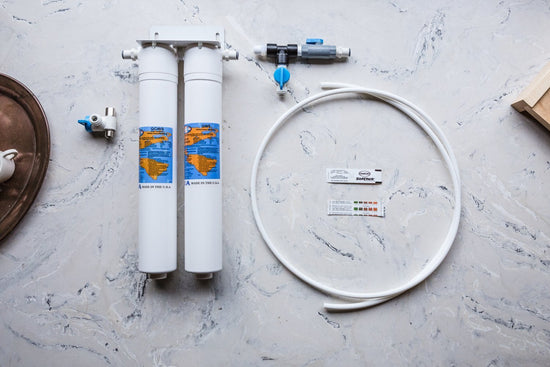The Importance of Water and Your Espresso Machine

Many of the machines we receive in the tech department have had repeated issues that are caused by poor water quality, which is something that seems to be overlooked too often. We want to fill you in on how you can avoid ever having to deal with a leak, a failed heating element, or a clogged machine, and be confident that it is being well cared for and will continue to serve your coffee needs for years down the road. Also, the quality of your water can either distract or enhance the taste of your espresso, so it’s important to get your water dialed in for longevity and great taste.
This guide will explore how water interacts with coffee, expand on the right water to use for your machine, and offer a few options to ensure you get the most out of your machine.

Taste
Just how important is the water you are using while brewing? Does it really matter? Our friends at La Marzocco describe it beautifully:
“…When we talk about extraction in coffee, water is so much more than a clear, somewhat tasteless liquid. It actually serves as the medium for flavor. While brewing, water takes in—or extracts—solids & oils that coffee holds, giving that once clear water some real substance. The final result is coffee. The ability for water to take things in is also predicated on the idea that it actually is a blank canvas, and that it has room to take those things in—only it isn’t. Not exactly. Water has all sorts of trace amounts of other minerals in it, giving both flavor and extracting ability. When it comes to brewing coffee, it’s important to understand that the more mineral content water has, the less it can take in from coffee, typically.”
Water and Your Machine
Figuring out the right water to use doesn’t need to be super complex. Primarily, we are looking for clean, filtered water that has some but not too much mineral content. We recommend using a TDS meter or water hardness test strips. The TDS meter will allow you to measure exactly how hard your water is. We recommend using a water softener if you get a measurement above 85 parts per million (PPM) or 5 grains per gallon (GPG). As mentioned above, some mineral content (above 35 PPM) is necessary for the best-tasting espresso, and also for the machine to run without overfilling the boilers. Reverse osmosis systems typically will take all the minerals out of the water, and this is problematic, as the machine requires mineral content for many of the internal sensors. For the most optimal results, the Specialty Coffee Association of America recommends hardness above 35ppm and below 85ppm.
Checking your water hardness cannot be stressed enough because water that is too hard can cause excessive scale buildup inside your machine. This will reduce heating efficiency, clog water passages, lead to inaccurate readings from temperature and level probes, and cause failure of valves and seals, which can cause a mess on your countertop. Also, because water quality in city water sources and wells changes seasonally, we recommend checking your water every three to four months.
The other basic requirement is filtration. This removes solids from the water, such as tiny pieces of dirt, rust, or grit. Additionally, water filters can reduce chlorine and other tastes and odors. Even if your water looks clean, a small amount of particulate matter will still pass through, which can lead to clogged water passages and leaking seals.
Filtration and softening prevent the most common threats to your machine's reliability, but there are many other factors to consider. We recommend you seek out a local expert if you have any questions or concerns about your area’s water.
Remember that problems arising due to poor water quality are not covered by warranty. But if filtration and softening care is taken, your machine will serve you well for years with minimal maintenance.

Water Options
What is the right water setup for you? Are you planning to plumb in your machine, or use the water reservoir?
For the Reservoir
Always check your water quality with test strips first because if you are in an area with soft water, you will need a softener. We love the Oscar Water Softening Pouch as well as the mineral packets from Third Wave Water. If you're going to go with an optional filter, there are many filtering pitchers, such as the Soma Water filter pitchers.
Bottled water is also an option, although slightly less friendly to the environment. With bottled water, these also vary in terms of mineral content, so we also recommend testing the bottled water with test strips. Crystal Geyser and Poland Springs are a couple of affordable water bottle companies with just the right amount of mineral content.
For Direct-Plumbed Machines
If your machine will be plumbed in, we recommend a water filter and softening system. These come with all the fittings you need to connect directly to your water source on one end and the water line directly to your machine on the other end. They are easy to install and will ensure you are getting the ideal water to your machine with every use. We recommend the more robust two-stage commercial water filtration and softening system if your water is very hard or if you're using your espresso machine for a coffee cart or cafe.
Feel free to contact us with any questions on water or finding the right setup for you! Want to keep reading? Check out The Science of Water Composition in Espresso in our blog. For a deeper dive into all things water, take the Water 101 course with Third Wave Water available exclusively through Coffee School.